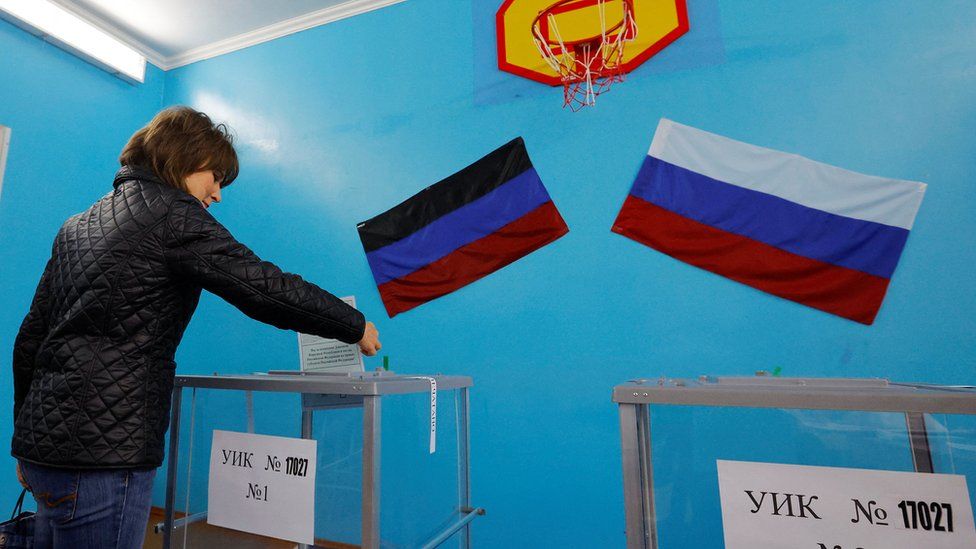By Patrick JacksonBBC News

Four disputed referendums have ended in Russian-held parts of Ukraine - votes which Moscow may use as grounds to annex more territory.
The votes were denounced as a sham by Ukraine's government and its Western allies, who regard them as stage-managed by the Kremlin.
Votes were held in the breakaway eastern regions of Donetsk and Luhansk.
Ballots in Russian-occupied parts of the southern regions of Kherson and Zaporizhzhia were also organised.
In the absence of international recognition, the process was not monitored independently for ballot-rigging.
Refugees scattered across Russia were also able to vote at dozens of polling stations, including in annexed Crimea. Early results from voting there indicated huge majorities in favour of joining Russia.
Up to four million people were asked to vote in the war-torn regions, which make up about 15% of Ukraine's territory.
There is speculation that Russian President Vladimir Putin may announce the four regions' annexation in a speech to a joint session of Russia's parliament on Friday.
In March 2014, he announced that Ukraine's Crimea Peninsula had joined Russia just a few days after a similarly unrecognised referendum was held.
If Russia annexes the four regions, it could take the war to a new and more dangerous level, with Moscow portraying any attempt by Ukraine to regain them as an attack on its sovereign territory.
The UK responded to the referendums with new sanctions targeting top Russian officials involved in enforcing the votes, while the US has warned Moscow it will impose further economic sanctions if it annexes more territory.
Ukrainian Foreign Minister Dmytro Kuleba called on the EU to impose more sanctions on Russia in response to the votes, which he said would not change Ukraine's military plans.
"It won't be enough to limit oneself to cosmetic economic measures," he said.
"We need an extremely serious, effective response with specific things that will hit the Russian economy. The softer the reaction to the so-called referendums, the greater the motivation for Russia to escalate and annex further territories."
Mr Putin defended the referendums, saying they were designed to stop the persecution of ethnic Russians and Russian-speakers by Ukraine - a charge the Ukrainian government denies.
"Saving people in all the territories where this referendum is being held is at the top of our minds and the focus of attention of our entire society and country," the Russian leader said in televised remarks.
An outcome of little surprise
The preliminary results of the four self-styled referendums will be of little surprise to anyone, least of all Ukraine.
The announced 97%+ votes in favour of joining Russia are a continuation of the Kremlin's narrative of trying to "liberate" Ukrainians in those areas, as well as its attempts to legitimise its presence in the country.
Ukraine and the West have discredited the process, and the BBC has heard evidence of armed soldiers collecting votes door to door, as well as claims of voting not being held at all.
Russia is expected to draft quick, new laws around the annexation of these four contested territories, and has threatened the use of more lethal weapons if they are targeted in the future.
What Kyiv has always said is that its objectives have not changed, regardless of the statements (and now results) which come from Moscow.
Early voting took place over four days, as election officials escorted by soldiers visited people's homes. Polling stations only opened on Tuesday.
"With my voice, I want to try to make a small contribution to stopping the war," Galina Korsakova, 63, from Donetsk told AFP news agency at a polling station in Crimea. "I really want to go home."
The unrecognised plebiscites were held as the war raged on, and at least one election official was killed, in a missile attack in the Zaporizhzhia city of Berdyansk.
Since Russia invaded Ukraine on 24 February, tens of thousands of combatants and civilians have been killed or injured, while whole cities and towns have been largely reduced to ruins.
More than 7.4 million Ukrainians are currently recorded as refugees, including nearly 2.7 million in Russia, UN figures show.
-
- 4 days ago
-
- 12 hours ago
Related Topics
from Via PakapNews